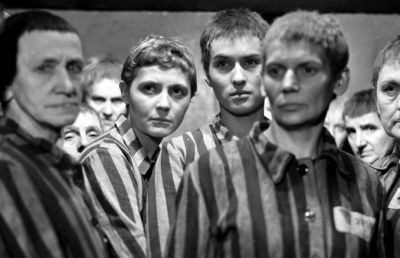
PASEŻERKA
(La passeggera/Passenger, Polonia/1963) R.: Andrzej Munk. D.: 64'. V. polacca
T. it.: La passeggera. T. int.: Passenger. Sog.: Zofia Posmysz. Scen.: Zofia Posmysz, Andrzej Munk. F.: Krzysztof Winiewicz. M.: Zofia Dwornik. Scgf.: Tadeusz Wybult. Mus.: Tadeusz Baird. Int.: Aleksandra Śląska (Liza), Anna Ciepielewska (Marta), Janusz Bylczyński (kapò), Anna Gołębiowska (prigioniera), Barbara Horawianka (infermiera), Anna Jaraczówna (kapò), Maria Kosciałkowska (Inga Weniger), Andrzej Krasicki (membro della commissione). Prod.: Zespół Filmowy Kamera.
35mm. D.: 64'. Bn. Versione polacca con sottotitoli inglesi / Polish version with English subtitles. Da: Filmoteka Narodowa per concessione di Studio Filmowe Kadr
Paseżerka è il quarto e ultimo film di Andrzej Munk, rimasto incompiuto a causa della morte improvvisa del regista in un incidente automobilistico. Inizialmente i suoi collaboratori non vollero metter mano al materiale, ma poi ci ripensarono: i loro contributi estremamente sensibili e intelligenti a un film profondamente originale furono al contempo un'opera di ricostruzione e un tentativo di comprendere il processo creativo dell'amico scomparso. La natura incompiuta del film, magnificamente conservata dagli amici di Munk, riesce perfino a rendere più intenso e sottile il risultato finale, soprattutto se si pensa ai tanti film sui campi di concentramento che sono caduti nella trappola del semplicismo o della volgarità: la tematica dei lager è quasi impossibile da affrontare sul grande schermo. Nella cinematografia polacca Paseżerka ha un importante precedente, L'ultima tappa di Wanda Jakubowska (1947), frutto di una testimonianza in prima persona. Per certi versi Munk riesce a trasmettere le stesse sensazioni ed è forse il miglior film di finzione sui campi di concentramento nell'indagare il complesso rapporto tra vittima e carnefice, e uno dei migliori in assoluto insieme al documentario di Resnais, Notte e nebbia (1955). Dissero i collaboratori di Munk: "Non abbiamo voluto chiarire quello che lui non aveva chiarito. Non abbiamo cercato conclusioni quando non eravamo certi che fossero anche le sue. Non abbiamo tentato di chiudere una struttura lasciata aperta dalla sua morte. Volevamo solo decifrare la sua opera così com'era, insieme al pubblico, conservandone le lacune e le reticenze, come si decifrerebbe un manoscritto reso frammentario dal tempo o dalle circostanze, arrivando così alla sua essenza chiara e vibrante. Andrzej Munk è un nostro contemporaneo. La sua memoria e la sua angoscia ci sono vicine. Non abbiamo osato cercare di indovinare le risposte verso cui si stava orientando, ma forse riusciremo a ripetere gli interrogativi che si poneva".
Peter von Bagh
Paseżerka is Andrzej Munk's fourth and final feature, a work left critically unfinished at the moment of the director's accidental death. At first his collaborators didn't want to touch the material. Then they thought otherwise; their impressively intelligent touches to a deeply original film were as much a reconstruction of a story as an attempt to dive into the thought process of their deceased friend. The unfinished nature of the film, beautifully retained by Munk's friends, might even elevate the intensity and subtlety of the treatment, given how many fiction films about concentration camps are either simplistic or coarse: the theme of concentration camps is well-known to border on impossibility for the cinema. Paseżerka had an impressive predecessor in Polish film, Wanda Jakubowska's The Last Stage (1947), that carries the full weight of first-hand testimony. Somehow Munk conveyed the same feeling. It might be the finest fiction film about concentration camps, in the sense of an intricate interplay between the roles of hangman and victim, and overall, along with Resnais' documentary Night and Fog (1955), one of the very best. Munk's collaborators stated: "We didn't want to clarify what he had not make clear himself. We didn't look for conclusions when we were not sure if they were his conclusions. We didn't try to close a framework that his death had left open. We only wanted to decipher this work as it is, along with the audience, with its lacunae and reticence, as sometimes one deciphers a manuscript where time or accident have destroyed fragments, and arrive, as we deciphered, at its essence, at what is clear and living. Andrzej Munk is our contemporary. His memory and his anxiety remain close to us. We did not dare guess the answers toward which he was heading, but perhaps we will succeed in repeating the questions he was asking himself".
Peter von Bagh

Tariffe:
Aria condizionata
Accesso disabili
Tel. 051 522285











